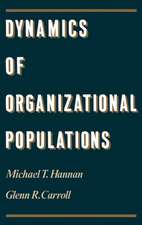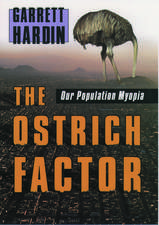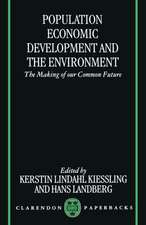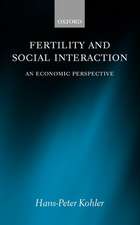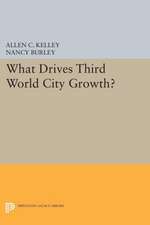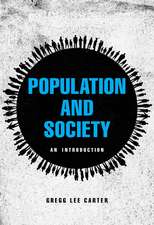Population Matters: Demographic Change, Economic Growth, and Poverty in the Developing World
Editat de Nancy Birdsall, Allen C. Kelley, Steven Sindingen Limba Engleză Paperback – 24 apr 2003
| Toate formatele și edițiile | Preț | Express |
|---|---|---|
| Paperback (1) | 369.23 lei 43-48 zile | |
| OUP OXFORD – 24 apr 2003 | 369.23 lei 43-48 zile | |
| Hardback (1) | 405.76 lei 43-48 zile | |
| OUP OXFORD – 30 aug 2001 | 405.76 lei 43-48 zile |
Preț: 369.23 lei
Preț vechi: 429.35 lei
-14% Nou
Puncte Express: 554
Preț estimativ în valută:
65.34€ • 76.62$ • 57.38£
65.34€ • 76.62$ • 57.38£
Carte tipărită la comandă
Livrare economică 06-11 februarie 26
Preluare comenzi: 021 569.72.76
Specificații
ISBN-13: 9780199261864
ISBN-10: 0199261865
Pagini: 458
Ilustrații: numerous figures and tables
Dimensiuni: 156 x 234 x 24 mm
Greutate: 0.65 kg
Ediția:Revised
Editura: OUP OXFORD
Colecția OUP Oxford
Locul publicării:Oxford, United Kingdom
ISBN-10: 0199261865
Pagini: 458
Ilustrații: numerous figures and tables
Dimensiuni: 156 x 234 x 24 mm
Greutate: 0.65 kg
Ediția:Revised
Editura: OUP OXFORD
Colecția OUP Oxford
Locul publicării:Oxford, United Kingdom
Recenzii
This book is oneof the most important contributions in the past few years to the debate about the macro consequences of population change.
Notă biografică
Nancy Birdsall is President of the Center for Global Development and Senior Associate at the Carnegie Endowment for International Peace, where she directs the economic reform project. She was the Executive Vice President of the Inter-American Development Bank from 1993 until September 1998. She is the author of numerous publications on economic development issues. Her most recent work is on the causes and effects of inequality in a globalizing world.Allen C. Kelley is James B. Duke Professor of Economics, Duke University.Steven W. Sinding is Director-General of the International Planned Parenthood Federation, headquartered in London. He directs a global federation of 147 affiliates operating programmes in 180 countries, and six regional offices around the world. Prior to joing IPPF, Dr Sinding was Professor of Population and Family Health at the Mailman School of Public Health, Columbia University, and Adjunct Professor of Public Policy in Columbia's School for International and Public Affairs.


